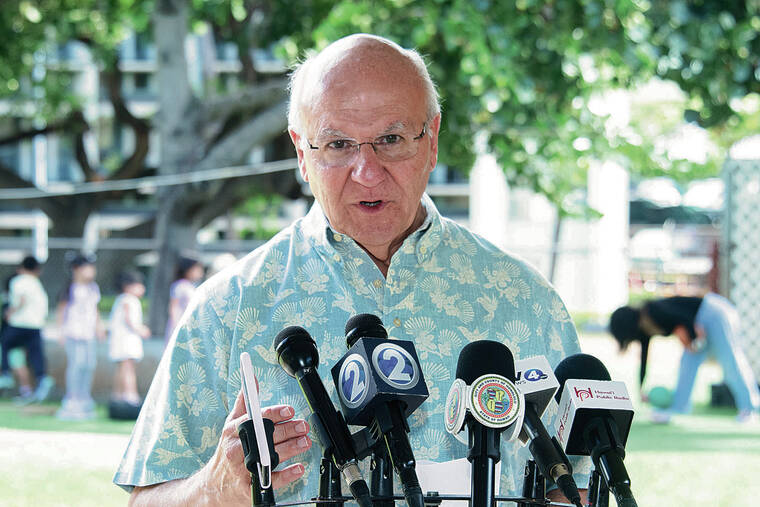Judge halts Honolulu’s 90-day short-term rental law

CRAIG T. KOJIMA/CKOJIMA@STARADVERTISER.COM
”I am disappointed, as I feel that the court did not recognize the importance of the 30 to 89 day restriction in curbing rampant illegal rental activity, but we will honor the court’s decision. ”
Mayor Rick Blangiardi
A U.S. District Court judge has granted a preliminary injunction ordering the city not to enforce the provisions in a new Oahu law that pertains to increasing the minimum allowable stay for Oahu rentals outside of resort districts to 90 days from 30 days.
The ruling issued Thursday by U.S. District Judge Derrick Watson enjoins the city “from enforcing or implementing Ordinance 22-7, signed into law on April 26, 2022, insofar as it prohibits 30-89-day home rentals, or the advertisement of such rentals, in any district on Oahu, pending further order from this Court.”
Watson added, “The court declines to stay this ruling or hold it in abeyance should an emergency appeal of this order be filed.”
Watson’s ruling, which could prompt additional legal action, is in response to a lawsuit filed in federal court in early June by the nonprofit Hawaii Legal Short-Term Rental Alliance asking for an order to stop the city from enforcing a new law that increases the minimum allowable stay to 90 days from 30 days.
HILSTRA’s lawsuit alleges that the new city ordinance, which goes into effect Oct. 23, is unconstitutional because it interferes with owners’ vested rights to own and rent property and violates state zoning law.
HILSTRA President Andreea Grigore, who is CEO of Elite Pacific Vacations, said in an email, “We are grateful for the court’s decision to grant HILSTRA the preliminary injunction in our challenge to Ordinance 22-7. The legislation was flawed from the beginning, and the ruling indicates the court understood and upheld the constitutional rights of Oahu owners.”
Don't miss out on what's happening!
Stay in touch with breaking news, as it happens, conveniently in your email inbox. It's FREE!
HILSTRA, made up of Oahu residents who rent out second homes on their properties or elsewhere and those who rent out their homes while traveling or working elsewhere, had argued that Ordinance 22-7, formerly Bill 41, caused “immediate and devastating” effects because it makes no provision for those property owners and operators who have purchased and legally rented their properties for periods of 30 to 89 days.
While the city set a grace period of April 21 for existing short-term rental owners to comply with the new rules, HILSTRA had said that action did not provide enough relief for owners or for the many businesses that provide services to and depend on these properties, such as cleaners, landscapers, property managers and booking agents. Altogether they pay millions in state and city transient accommodation and general excise taxes, the alliance contends.
When he signed the bill April 26, Honolulu Mayor Rick Blangiardi said the city anticipated legal challenges to the new restrictions. Blangiardi said Thursday in an email, “I am disappointed, as I feel that the court did not recognize the importance of the 30 to 89 day restriction in curbing rampant illegal rental activity, but we will honor the court’s decision. We are currently evaluating the impact of the decision and will have more details to offer soon about what we will be doing to protect our residential neighborhoods.”
City Corporation Counsel Dana Viola added in an email, “The Department of the Corporation Counsel is presently reviewing our legal options while the city remains focused on aggressively enforcing the restriction on rentals of less than 30 days, which has not been affected by the court’s decision.”
Kekoa McClellan, spokesperson for the American Hotel & Lodging Association, said, “While this order does limit the DPP’s ability to enforce the 30 day contracts, it does not restrict 22-7’s restriction of short-term rentals to the resort zone or the increased regulations on short-term rentals or the fine and fee structure put in place or the preservation of holding platforms accountable for posting requirements or other important tools that we put on the books.”
Still, Watson’s ruling was a significant temporary step forward for HILSTRA. It gives Oahu short-term rental owners, who had been renting for fewer than 90 days, a temporary opportunity to continue to advertise and rent their properties for shorter periods. Eventually, HILSTRA hopes that these short-rental owners would be grandfathered in under the new law, similar to the continued use of structures that lawfully existed prior to new zoning restrictions.
Choon James, a North Shore Realtor, has strongly opposed illegal vacation rentals. However, she said she does not oppose Watson’s ruling as she views the 90-day stipulation as an “overreach” that is “inconsistent with existing rules and regulations.”
“Once you aren’t consistent, you are up for lawsuits like this,” James said.
It’s unclear the impact that legal action will have on the coming short-term rental overhaul. Various concerns about short-term rentals have been raised over the years by tourism industry groups like the American Hotel & Lodging Association, Hawaii Tourism Authority, Hawaii Hotel Alliance and Hawaii Lodging & Tourism Association as well as community groups like Hawaii’s Thousand Friends, Save Oahu’s Neighborhoods, Keep It Kailua, Save North Shore Neighborhoods and Hi Good Neighbor.
The impetus for the city’s new rules came largely from complaints that short-term rentals are changing the face of residential neighborhoods, with loud visitors and overcrowded streets due to insufficient parking, and that the operations reduce the availability of long-term rentals for local residents.
Larry Bartley, executive director of Save Oahu’s Neighborhoods, said, “We are extremely disappointed by the temporary injunction. But I think the city will win the lawsuit. It’s too bad that this throws a monkey wrench into the city’s plans to enforce right away, but it’s been a 17-year process for me — another few weeks, here and there, is something we can tolerate. We plan to keep fighting on.”
HTA President and CEO John De Fries said in an email, “This injunction delays the City & County of Honolulu’s ability to manage illegal vacation rentals, which increase visitor counts, bring visitors into our neighborhoods, and compromise our collective ability to properly host them. As guided by our community-generated Destination Management Action Plans, we support the management of illegal vacation rentals and will be closely tracking this issue.”
McClellan said the city must defend its right to define short-term rental use, while preserving the 90-day minimum rental period.
“In 22-7, the city reiterated for a third time that residential properties are not intended for hotel use,” he said, adding that the city also made these distinctions in 1990 when it stopped issuing nonconforming-use certificates for short-term rentals, and again with the passage of Bills 85 and 89 in 2019.
Chuck Prentiss, spokesperson for Keep It Kailua, said it’s important that the city find a way to keep the 90-day provision in the rules, as “a lot of people fought very hard to get it in there. There was a lot of subterfuge when it was 30 days. It was impossible for the city inspectors to enforce.”
Prentiss said the provision is needed because illegal short-term rentals are operating by the thousands on Oahu.
“If you could stop these short-term rentals, half of the housing deficiency would be solved,” he said. “It’s not only that. It’s the effect on the neighborhood. We don’t want the residential neighborhoods changing into the old Waikiki jungle. We see people traipsing all over the place. You don’t know your neighbors from week to week.”
———
Honolulu Star-Advertiser reporter Leila Fujimori contributed to this story.





